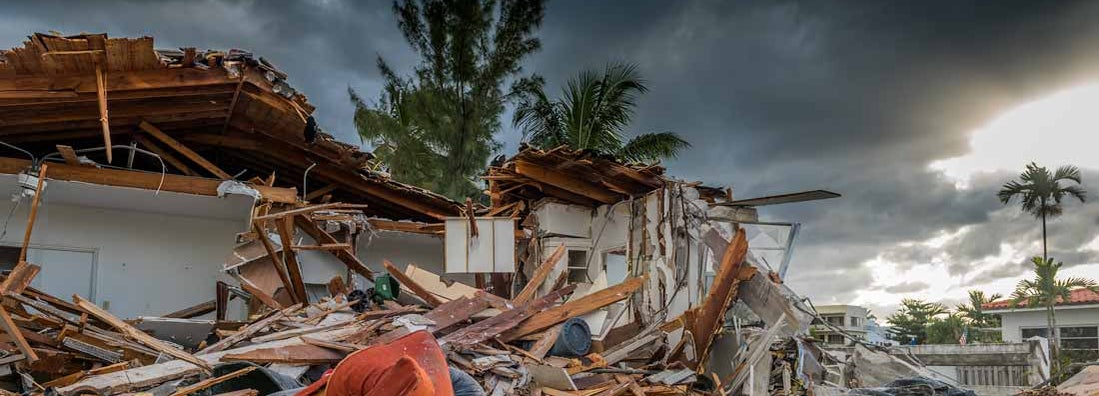Vermont Earthquake Insurance
Independent agents in Vermont shop multiple companies to get you the best price on earthquake insurance.

Many people think of California when discussing earthquakes, but throughout our nation's history, these seismic events have rocked the New England area, including Vermont, which has suffered the effects of numerous earthquake events. The only protection against property damage caused by tremors and quakes is earthquake insurance. Before you search for quotes on such policies, however, there are several things to keep in mind.
Use our independent agent matching system to find the best insurance plan in your area. You tell us what you’re looking for, and our technology will recommend the best agents for you. Any information you provide will be sent to only the agents you pick. We do not sell to third parties.
Are Earthquakes Common in Vermont?
Although earthquakes do not affect Vermont residents as much as they do those living on the West Coast, earthquakes can and do happen here with relative frequency.
- The first recorded earthquake, probably centered in the St. Lawrence Valley, shook the New England area on June 11, 1638. Dozens more struck Vermont throughout the infancy of the nation.
- On Dec. 20, 1940, a strong earthquake (estimated magnitude 5.8) occurred near Lake Ossipee, New Hampshire. A shock of approximately the same intensity struck four days later. Some damage resulted in the epicentral region. At Bloomfield, Vermont, some old chimneys had their top bricks displaced.
- All of Vermont felt tremors from a magnitude 5.2 earthquake located in western Maine. The shock of June 14, 1973, struck an area of about 250,000 square kilometers, including portions of Maine, New York, eastern Quebec Province and all of Connecticut, Massachusetts, New Hampshire and Rhode Island. In Montpelier, Vermont, plaster cracked, chimneys moved away from walls and some road surfaces cracks.
How Prepared Are We in Vermont?
Although earthquakes are not a common occurrence in Vermont, neither are they rare. In 1994, the Vermont Emergency Management Agency funded a study of Vermont to determine the potential types and severity of damage that could result from earthquakes in New England. State and national emergency departments have analyzed this study – A Report on the Seismic Vulnerability of the State of Vermont by J. E. Ebel, R. Bedell and A. Urzua. The study concludes that there is some risk to the population and there are precautions that people can take to reduce the injury and damage that could result from ground shaking.
Vermont does not have many large urban areas where the collapse of skyscrapers and overpasses would be a problem. However, it does have old masonry buildings and buildings not engineered with earthquakes in mind. The lack of preparedness is a concern. The Federal Emergency Management Agency and the New England States Emergency Consortium provide information on emergency preparedness.
Why Is Earthquake Insurance Important?
Although VT may never be the epicenter of an earthquake, the geological structure of the East Coast puts New England at higher risk of damage from tremors than it does the West Coast.
The USGS found that the farthest landslide from the 2011 Virginia earthquake was 150 miles from the epicenter. This is by far the greatest landslide distance recorded from any earthquake of similar magnitude. Although earthquakes in the central and eastern U.S. are tens of times less frequent than in the western U.S., they typically affect a much broader region. East of the Rocky Mountains, an earthquake can affect an area as much as 10 times larger than a similar magnitude earthquake on the West Coast.
The August 2011 earthquake that rocked New England caused an estimated $200 to $300 million in damage. Insurance covered only $100 million of that amount.
How Can You Prepare?
Aside from protecting your property with an earthquake insurance policy, you can take steps to better prepare for the next tremor strikes.
Fortunately, today we have a warning system for earthquakes that was not available to the settlers when earthquakes struck Vermont. Be sure you pay attention to any seismic warnings given by VEMA or FEMA.
Vermont residents should prepare an emergency kit and have it on hand at all times. This should include a radio, flashlights and batteries, a first aid kit, and enough prepackaged food and water to last at least 72 hours.
Make certain that breakable and flammable items are stored in low, closed cupboards with latches, and that you move heavy items close to the ground or firmly secure them to prevent injury or damage from falling objects. The most secure locations in your home are underneath a sturdy table or against an interior wall away from windows and doors.
Perform occasional earthquake drills with your family, reminding everyone to drop, cover and hold on to something solid.
What Does Earthquake Insurance Cover?
Because traditional homeowners insurance policies generally do not cover earthquakes, many Vermont insurance providers offer riders to provide some level of earthquake protection to homeowners.
This coverage usually comes with a high deductible, but it will provide substantial coverage in the event that a significant seismic event destroys your home. Earthquake insurance includes coverage for damage to the foundation or basement, the overall structure of the home, and damage to the interior of the home.
However, the coverage offered by different policies may vary. For example, some policies will cover accessory structures such as garages, while others cover damage only to the home. Some of the more comprehensive plans will provide coverage for personal belongings in your home. Be sure to discuss the various coverage options with your insurance agent to secure the right policy for you.
What Is an Average Earthquake Insurance Rate Quote?
You may think earthquake insurance is expensive, but because your home is most likely your biggest investment, protection from natural disasters is necessary. Fortunately, Vermont is not located directly over or near a known fault line, so the quotes you will receive will not be as high as the quotes for residents of the West Coast.
Your quotes will also depend on the materials used to construct your home. Homes that are made of wood generally cost less to insure than those made of brick. This is because wood-constructed homes are more flexible and can better withstand the jarring motions caused by an earthquake. Homeowners can often receive lower quotes by retrofitting their homes to make them better able to withstand an earthquake. You can do this by securing the structure to the foundation and installing a sprinkler system in the home.
When choosing an earthquake insurance policy, it's always a good idea to compare multiple quotes from a variety of insurance companies.
Protect Yourself with Earthquake Insurance
Navigating the risks and coverage options of earthquakes and insurance can be tricky. That's why knowledgeable independent insurance agents in the Trusted Choice® network are here to help. Their experience working with insurance companies to find competitive rates and filing claims can be invaluable to Vermont residents at risk of seismic activity.
Contact an agent near you to find out how you can get protection against earthquake damage.
